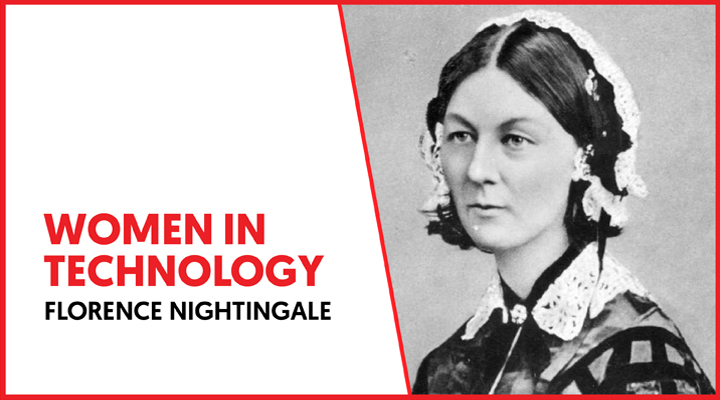
Our today’s protagonist wasn’t expected to have her own space in history because she was a woman. In the Florence of the XIX century, Florence Nightingale’s family wanted her daughter to marry and take care of the house, but her big passion about the sanitary field made her to decide to study statistics first and to lay the foundations of modern nursing after. Our colleague Lorena González introduced her to us as follows:
“The story of Florence Nightingale catches my attention. She was able to transform the world of nursing and hospitals not with her skills as a nurse, but with her statistical contributions. She was a pioneer in the idea that social phenomena can be measured and submitted to mathematical analysis.”
Who was Florence Nightingale?
Florence Nightingale was a british nurse, writer and statistician considered the forerunner of the modern professional nursing and creator of the first conceptual model of this profession, introducing in 1860 the world’s first lay nursing school at Saint Thomas hospital in London. However, Florence went down in history under the pseudonym “the lady with the lamp” acquired during the Crimean conflict, as she used to make night rounds with a lamp to be able to care for her patients.
Biographic notes
Florence Nightingale was born the May 12th, 1820 in Florence (Italy) and she died in London, on August 13th, 1910. Raised by a British family, her fathers had a very definite destiny for her and for her sister, a task Florence challenged in favour of her vocation. In 1837 she claimed to have received God’s call to dedicate herself to nursing, something that her relatives did not like, since the care of the sick was associated with lower-class women.
Her family position gave her the opportunity to study mathematics and statistics, as well as to acquire knowledge of epidemiology and health statistics, and to travel to different parts of Europe. At that time, nursing was unregulated and the women who devoted themselves to it did not receive academic instruction. It is here where the figure of Nightingale supposes a before and after in this field, since it turned this discipline into a trade for which it was necessary obligatory formation and advanced sanitary knowledge.
Florence Nightingale never married or had children, as she felt an almost religious duty towards her professional career.
Legacy at the Tech Industry
Although she had already proved herself at the head of the Institute for the Care of Sick Ladies in London, Florence Nightingale’s life changed when she was called to coordinate a group of nurses in the Crimean War because of the situation there: ten times as many soldiers died in this conflict from diseases such as typhus, cholera and dysentery as from wounds on the battlefield. After Florence’s administration – focused on statistical evidence related to hygiene and cleanliness – the number of deaths fell drastically. On her return, Nightingale asked Queen Victoria for an audience and convinced her of the need to implement drastic reforms in British hospitals, backed up by all the scientific evidence she had collected during her stay at the front and which she would then publish under the title ‘Notes on nursing: What it is and what it is not’.
Finally, in 1860 he achieved one of his greatest goals: to inaugurate his country’s first official nursing school, which he named the Nightingale Training School, at Saint Thomas Hospital. Today, this institution is called Florence Nightingale School of Nursing and Midwifery & Palliative Care and is managed by King’s College London.
Curiosities
Florence Nightingale has received numerous awards for her work and experience in the scientific and health fields. Among them are the Royal Red Cross (RRC) awarded by Queen Victoria in 1883 and the Order of Merit of the United Kingdom, this being the first time that this award was received by a woman. International Nursing Day is celebrated on 12 May in her honour, as it is the date of her birth.


